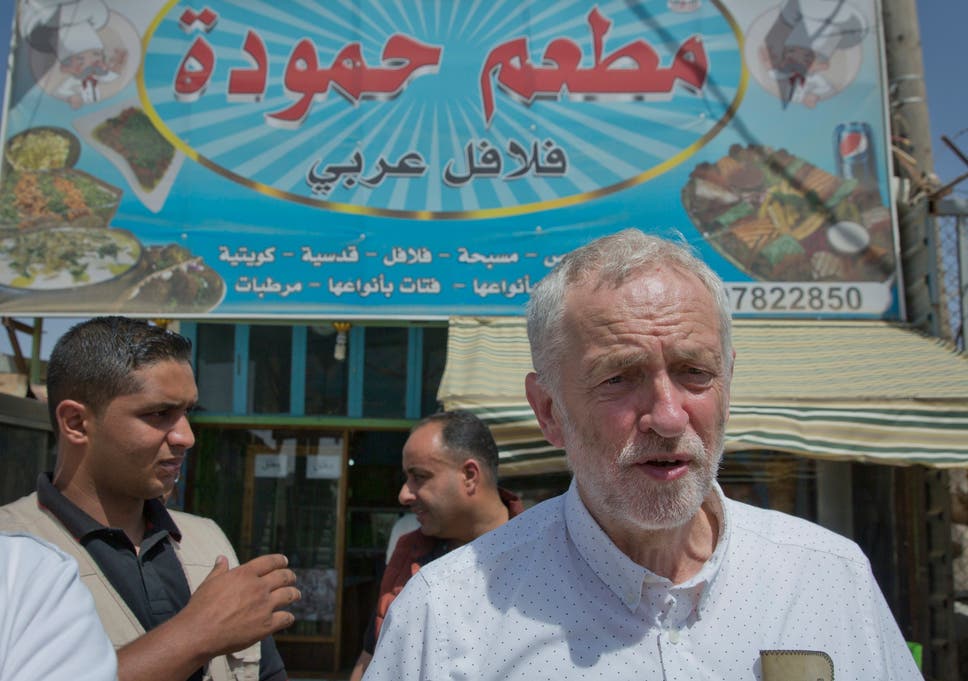
UK would 'recognise Palestine as state' under Labour government, Jeremy Corbyn says
Party leader says Labour would take step 'very early on' after winning power as he visits Palestinian refugees
23-06-2018  Jeremy Corbyn walks through a market during his visit to the Zaatari Syrian refugee camp in Jordan ( AP )
Jeremy Corbyn walks through a market during his visit to the Zaatari Syrian refugee camp in Jordan ( AP )
The UK would swiftly “recognise Palestine as a state” under a Labour government, Jeremy Corbyn has said.
The party’s leader said he would take steps towards “a genuine two-state solution” to the Israeli-Palestinian conflict “very early on” if Labour won a general election.
Mr Corbyn was speaking in Jordan during his first international trip outside Europe since he was elected Labour leader in 2015.
It included a visit to a decades-old camp for Palestinians uprooted during Arab-Israeli wars.
“I think there has to be a recognition of the rights of the Palestinian people to their own state which we as a Labour Party said we would recognise in government as a full state as part of the United Nations,” said Mr Corbyn.
Ahead of a visit to Al-Baqa’a refugee camp on Saturday, home to about 100,000 Palestinians, he tweeted: “The next Labour government will recognise Palestine as a state as one step towards a genuine two-state solution to the Israel-Palestine conflict.”
Mr Corbyn is a vocal critic of the Israeli government's actions towards Palestinians and has previously called on the UK government to unilaterally recognise a Palestinian state in the West Bank, Gaza and East Jerusalem, which Israel occupied in the 1967 war.
In April, he attacked Western “silence” over Israel’s killing of Palestinian protesters on the Gaza border and said Britain should consider stopping stopping the sale of arms to Israel that “could be used in violation of international law”.
Allegations of antisemitism within the Labour Party have dogged Mr Corbyn since his election as Labour leader, with critics accusing him of allowing abuse to go unchecked.
Asked about the issue by reporters in Jordan, he said there was “no place whatsoever for antisemitism in our society”.
“There has to be a peace process, and there has to be a right of the Palestinian people to live in peace, as well as the right of Israel,” he added.
Mr Corbyn described Donald Trump’s decision to recognise contested Jerusalem as Israel’s capital and move the US Embassy to the disputed city as a “catastrophic mistake”.
With the trip to Jordan, Mr Corbyn appeared to be attempting to boost his foreign policy credentials.
On Friday, he toured Zaatari, Jordan’s largest camp for Syrian refugees. Taking questions from reporters its market, he said a Labour government would “work very, very hard to regenerate the peace process” in Syria.
Without a solution, “the conflict will continue, more people will die in Syria and many many more will go to refugee camps, either here in Jordan or come to Europe or elsewhere,” he added.
More than six million Syrians have fled war in their homeland, with a majority finding refuge in neighbouring host countries such as Jordan. Hundreds of thousands more have migrated onward to Europe, with Germany taking in the bulk.
Mr Corbyn said Britain could do much more to shelter Syrian refugees, particularly unaccompanied children, arguing that the government’s quota of 20,000 refugees was “very, very small compared to any other European country".



